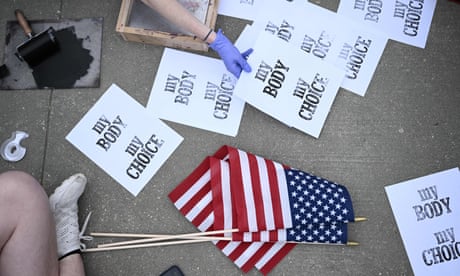- by foxnews
- 08 Apr 2025
How soon could US states outlaw abortions if Roe v Wade is overturned?
How soon could US states outlaw abortions if Roe v Wade is overturned?
- by theguardian
- 05 May 2022
- in news

An unprecedented leak of a draft supreme court decision shows a majority of justices support ending federal protections for abortions in arguably the most controversial court case in generations.
While the draft could still change, if it is not substantially altered it would result in 26 states immediately, or as soon as practicable, banning abortion, a sea change in the American legal and political landscape.
If the draft decision remains substantially unchanged, it would return the issue of abortion to the states, 26 states stand poised to ban or greatly restrict it. Until the court issues a final decision, the right to abortion is protected under federal law.
A recent poll found 70% of Americans think abortion is a choice that should be left to a woman and her doctor, and polling over time has shown support for legal abortion has changed little since Roe v Wade was decided. Only a small minority think abortion should be completely illegal.
The federal right to abortion hangs on a supreme court decision because, in the nearly 50 years since Roe v Wade was decided, congressional leaders failed to protect the right in statute.
However, two key Democratic senators, Joe Manchin and Kyrsten Sinema, oppose such a change. It is unclear how the leaked opinion may change their position. Sinema has said she supports abortion rights, while Manchin has issued conflicting messages.
Biden has called on Americans to elect more members of Congress who support reproductive rights in the upcoming midterm elections in November.
If the issue of abortion were to return to the states, 26 would immediately or as soon as practicable ban abortion.
Trigger bans vary from state to state. While Arkansas requires an attorney general certification, Wyoming requires the governor to certify Roe has been overturned before the law goes into effect five days later.
Other bans, once blocked by the courts because of Roe, could also go into effect. Enforcement of a six-week abortion ban in Iowa could go into effect. Because that is just two weeks after a pregnant person might miss a period, and before most people know they are pregnant, it is effectively a near-total ban.
In all cases, laws will probably be challenged by reproductive rights groups, and it will take time for cases to move through state and perhaps federal courts. Some experts have estimated it could take between six months to two years for most cases to be settled.
What is certain is in that time, Republican-led states would probably seek to push the envelope in terms of criminalizing abortion, and seek to enforce the bans they already have on the books.
Making abortion illegal will not stop abortions. People who live in states where abortion is outlawed but want to terminate a pregnancy may seek to travel to states where it remains legal, or obtain medication to end a pregnancy.
Medication abortion can safely end pregnancies up to 10 weeks gestation using a two-pill protocol. However, in states where abortion is illegal, those pills would need to be obtained illicitly, perhaps through through the mail.
Patients who want to go to clinics, or whose pregnancy is too far along to be self-managed with medication, would need to travel potentially hundreds of miles to states where abortion is legal. That may be an impossible hurdle for women whose finances are strained or who cannot find childcare.
People who live in states where abortion remains legal would also be impacted, because they would face longer wait times for appointments as patients flood into clinics from out-of-state. This could create a secondary wave of travel.
Even more broadly, outlawing abortion would substantially undermine care for basic obstetric procedures, such as miscarriage and ectopic pregnancies, in a country which already has among the highest maternal mortality rates in the developed world.
Some Democrat-led states, such as Oregon, are working to protect abortion by providing funds for people who travel to their states to obtain abortions. Others, such as California, are working to build capacity for the thousands of woman who could suddenly find the nearest abortion clinic there.
But in all cases, these efforts will be incomplete. Not all people will be able to travel or obtain medication abortions, and may forced to carry an unwanted pregnancy to term.
- by foxnews
- descember 09, 2016
Ancient settlement reveals remains of 1,800-year-old dog, baffling experts: 'Preserved quite well'
Archaeologists have recently unearthed the remarkably well-preserved remains of a dog from ancient Rome, shedding light on the widespread practice of ritual sacrifice in antiquity.
read more


